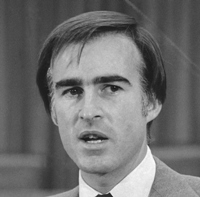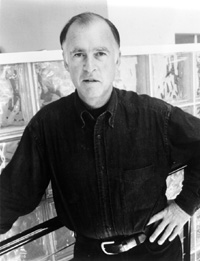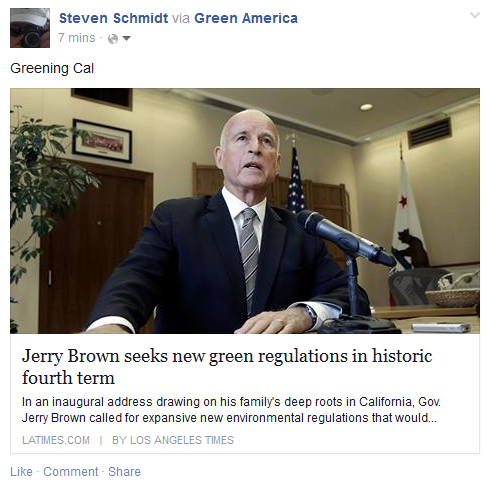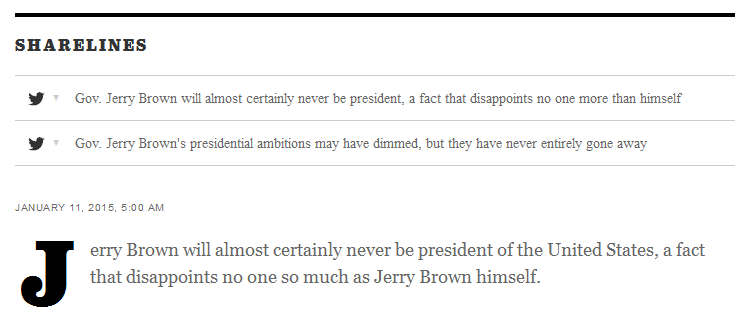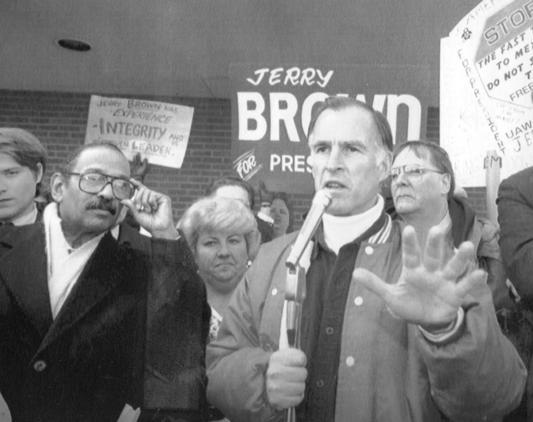Governor Jerry Brown
From the 1970s to 2015 ...
The last week of 2014, GreenPolicy360 highlighted the work of Pope Francis.
This week, the first week of 2015, we have highlighted the work of Edmund G. 'Jerry' Brown.
Perhaps it is fitting to move from a Jesuit pope on to a former Jesuit seminarian -- now 76 and Governor of California.
Update: July 21, 2015 Gov. Jerry Brown, speaking at a Vatican conference hosted by Pope Francis, addresses global climate and green energy.
§
§
"California feeds on change and great undertakings, Jerry Brown said in Monday's (January 5, 2014) swearing-in speech, "but the path of wisdom counsels us to ground ourselves and nurture carefully all we have started..."
§
January 5, 2015 Inauguration Speech (video)
§
Some years ago, your GreenPolicy editor had the opportunity to serve as an advisor to Jerry's presidential campaign and the Governor and I worked closely on the campaign's We the People platform. Political reform across a breadth of issues was on our agenda. The preparation of briefing books for the debates was a challenge, as we argued watering down of environmental and work protection laws was flawed policy. Up until the 90's the US had set green and labor standards which were being set aside by both parties in the 90s. We argued for a better approach, and for money out of politics, and univ health care, and we came close to winning the nomination which eventually went to the next president, Bill Clinton. The many green ideas we brought forward continued on in the Green Platform which your siterunner was the key drafter and Jerry and his ideas and agenda carried on in California. To this day, Governor Brown is out in front with model initiatives for change. Decades now, day-to-day, Jerry has been hard at work to make a difference and create, with vision, a better world.
Here's a nod of our green hat to Jerry Brown -- a principled visionary, making it happen.
§
Today the press reports -- California leads the nation and Jerry Brown's point of view? “What happens here doesn’t stay here. It goes all around the country and all around the world.”
California continues as a world leader in Clean Air/Emissions Control and Policies Addressing Climate Change - Governor Brown Establishes Most Ambitious Greenhouse Gas Reduction Target in North America: New California Goal Aims to Reduce Emissions 40 Percent Below 1990 Levels by 2030
The 'greening' results are showing... Transportation High Speed" -- Energy -- Climate Change -- working with Arnold who added real environmental Muscle
Jerry's 'We the People' 1992 presidential campaign in Michigan
§
- Out in Front on Climate Change
"At the Front Lines: An Interview with California Governor Jerry Brown on 'Laudato Si'
America Magazine | Jul 7 2015
California Governor Jerry Brown has spent his entire life in public service. After college Brown spent a few years as a Jesuit seminarian. He has spent the 45 years since serving the state of California at every level, from Los Angeles community college district trustee to mayor of Oakland, state Attorney General, governor, candidate for Senate twice, and candidate for the presidency three times. In his 1992 run he carried six states, and came in second in voting at the Democratic convention to Bill Clinton...
I think it definitely advances the church’s position on the environment. The pope made a very clear articulation of the responsibility and the respect that human beings owe the rest of creation. And he’s taking on a real existential threat to the underlying conditions on which our civilization is dependent, the stability of the climate, which has been very favorable for the last 10 to 12 thousand years. So it’s important for reorienting Catholics to the rules and the laws of nature that can’t be ignored or abused in the name of individual freedom or desire or initiative. As people work out their various ways of living they have to take into account not just what they want to do, but what nature dictates and what science tells us about the way human beings are enmeshed in and dependent on a greater and complex web of life.
The pope is also raising the point, which gets serious opposition from many quarters, of how much material stuff is really appropriate, that there are certain limits and certain ways of living and industrializing and carrying on that are more compatible with a sustainable and healthy environment. The encyclical raises a real challenge to a modern world that is so dependent on the market for authority and for the allocation of life’s goods and services. The pope is raising the ante, saying No, you have to look at the impact. When you’re disturbing the environment you’re going to create negative feedbacks that are going to be felt disproportionately by poorer people, more vulnerable people who don’t have the assets and the capital to protect themselves against the extreme weather and the disruptions that follow in the wake of an impaired climate regime, which is where we’re going.
So all in all I’d say it’s a welcome voice, a clear voice that definitely lays out ideas consistent with the Catholic tradition but also very related to the times that we’re in...
alifornia has this history that really derives from the experience of smog in the Los Angeles Basin, and the response to that over many administrations has led to where we are today. As a matter of fact the standards that were established under the so-called Pavley Law [the first legislation in the world to regulate greenhouse gas emissions in passenger vehicles], were ultimately adopted by the United States as the national standard. Today Los Angeles has ten times as many cars as it did in the 50s, and the air is 95 percent cleaner. That’s a pretty dramatic move, one that countries like China and India are taking notice of.
So we’ve had that history. As far as people’s attitudes I would say that there is a strong preference for favoring policies that nurture the environment as oppose to those that disrupt them.
But if you dig deeper into the use of things or creature comforts, I don’t think we’ve attained the level of enlightenment that Pope Francis is calling for.
§
http://www.greenpolicy360.net/w/California_out_in_front_in_a_Green_future
http://www.greenpolicy360.net/mw/images/Pacific_Coast_Climate_Action_Plan.pdf
§
- Updates: Confronting Historic Drought-Climate Change
April 2015 -- Brown orders California's first mandatory water restrictions: 'It's a different world'
Standing in a brown field that would normally be smothered in several feet of snow, Gov. Jerry Brown on Wednesday ordered cities and towns across California to cut water use by 25% as part of a sweeping set of mandatory drought restrictions, the first in state history.
http://gov.ca.gov/news.php?id=18910
PBS Interview - http://www.pbs.org/newshour/bb/gov-jerry-brown-california-change-whats-comfortable-address-drought/
§
Challenge and Best Practice Solutions...
In his re-election victory speech Tuesday night, Brown mentioned Props 1 and 2 as being vital to his goals as governor.
"Save money, save water, those are two pillars," Brown said.
§
November 2014 - the State of California under the leadership of its green governor, Jerry Brown, passed a set of laws, with Proposition One at the center of a wide-ranging plan to encourage a range of water conservation usage and saving measures, California again out in front of national/global efforts to deal with climate change/drought.
Having led the effort to shape and urge passage of a top state priority in the 2014 election, the Governor succeeded as voters passed Proposition 1 – the Water Quality, Supply and Infrastructure Act of 2014 – by a margin of 67%-33%. Proposition 1 provides $7.5 billion in new and redirected bond funds for a wide range of water related projects that will:
• Protect rivers, lakes, streams, coastal waters and watersheds • Provide regional water security, climate and drought preparedness • Provide public benefits through a wide range of water storage options that demonstrate improvement to the state water system, cost-effectiveness and net improvement in ecosystem and water quality conditions • Promote water recycling • Improve drinking water quality • Provide increased flood protection
§
California Launches Program to Protect Farmland & Climate
The California Climate and Agriculture Network (CalCAN)is a coalition that advances sustainable policies to support California agriculture in the face of climate change. http://calclimateag.org/about/
The goal is to "integrate funding for permanent agricultural easements with urban land use projects to maximize the gains in reducing greenhouse gases linked to vehicle miles traveled and urban development. This is the first program in the country that invests in farmland conservation for its climate benefits."
Sustainable Agricultural Lands Conservation Guidelines
§
